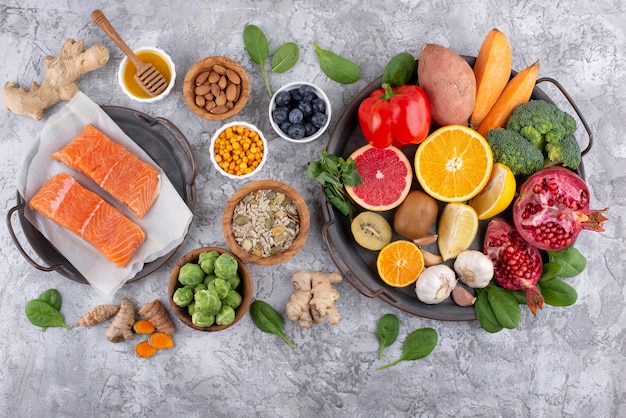Healthy eating and metabolism have a strong connection. What you eat affects how your body turns food into energy. Metabolism is the process that helps your body break down food and use it for energy. It controls how many calories you burn, how much energy you have, and how well your body manages weight.
A healthy metabolism keeps you active, helps you stay at a good weight, and supports important functions like digestion and blood circulation. Many things can affect metabolism, such as age, activity levels, and genetics, but food plays a key role. Eating the right foods can help your body burn calories more efficiently, balance hormones, and use energy better.
By choosing healthy foods, you can keep your metabolism working well. This guide will explain how eating the right way helps metabolism based on facts from scientific research.
What Is Metabolism?
Metabolism is the process of how your body turns food into energy. It keeps you alive by powering essential functions like breathing, digestion, and circulation. Metabolism has three main parts:
- Basal Metabolic Rate (BMR): This is the energy your body needs to function while resting. It makes up 60-75% of the calories you burn every day.
- Thermic Effect of Food (TEF): Your body uses about 10% of your daily calories to digest and absorb food.
- Physical Activity: Moving your body—whether through exercise, walking, or even small movements like fidgeting—burns extra calories.
What Does Your Metabolism Do?
Metabolism controls how your body uses food for energy. It decides how fast calories are burned and how nutrients are processed. This affects body weight, energy levels, and overall health. Here are some key functions of metabolism:
Energy Production: It breaks down food, like carbs, fats, and proteins, to create energy. This energy is used for everything your body does, from breathing to moving.
Nutrient Absorption: It helps your body absorb important vitamins and minerals, making sure they are used properly.
Hormonal Regulation: It controls hormones like insulin and thyroid hormones, which affect weight, energy levels, and how food is stored.
Muscle Maintenance: It keeps muscles strong. Since muscle burns more calories than fat, having more muscle helps you burn more energy, even when resting.
Several factors influence metabolism, including age, genetics, body composition, and diet. As people age, they lose muscle mass, slowing down metabolism. However, eating the right foods and maintaining an active lifestyle can counteract this decline.
How Healthy Eating Boosts Metabolism

Eating healthy foods at the right time can boost your metabolism. The food you eat affects how well your body burns calories. Making the right food choices can increase your energy, help you maintain a healthy weight, and keep your metabolism working well.
1. Eating More Protein
Protein needs more energy to digest than fats or carbs. This means that eating protein helps you burn more calories just through digestion. This effect is called the thermic effect of food (TEF). Protein has the highest TEF, using 20-30% of its calories for digestion.
A high-protein diet (40% protein) burns more calories than a lower-protein diet (15% protein). This means that eating enough protein can help increase your metabolism.
Some of the best protein-rich foods are:
- Lean meats (chicken, turkey, fish)
- Eggs
- Beans and lentils
- Greek yogurt and cottage cheese
- Nuts and seeds
Protein also helps keep your muscles strong. Since muscles burn more calories than fat, having more muscle keeps your metabolism working faster. This is why eating enough protein is especially important when trying to lose weight or build strength.
2. Spicy Foods
Spicy foods like chilli peppers can help the body burn a few extra calories. They contain a compound called capsaicin, which has been shown to increase metabolism slightly and may also reduce hunger.
- Eating a small amount of chili peppers or cayenne pepper daily might help the body burn more fat.
- Capsaicin can also make you feel fuller, which may help you eat less.
- While the effect is not very strong, adding spicy foods to your meals can boost your metabolism.
Even though spicy foods alone won’t lead to big weight loss, they can be part of a healthy diet that supports metabolism.
3. Green Tea and Coffee
Green tea and coffee help the body burn stored fat and use it for energy. This makes metabolism work faster and can support weight management.
- Caffeine in coffee helps release fat from fat cells. This makes it easier for the body to burn it as energy.
- Green tea has catechins, which work with caffeine to increase the number of calories the body burns.
- Drinking green tea or coffee before exercise may help burn more fat and improve workout performance.
However, drinking too much caffeine can cause sleep problems or anxiety. It is best to drink these in moderation and avoid them before bedtime.
4. Essential Nutrients
Getting essential nutrients keeps the thyroid healthy. The thyroid gland plays a key role in controlling metabolism. If it does not function properly, metabolism slows down. This makes it harder for the body to burn calories efficiently.
Foods rich in minerals include:
- Iron-rich foods: Red meat, spinach, lentils
- Selenium-rich foods: Brazil nuts, seafood, eggs
- Zinc-rich foods: Nuts, seeds, whole grains
If the body lacks these minerals, the thyroid may not work properly. This can slow metabolism and make it harder to maintain a healthy weight.
Frequently Asked Questions (FAQs)
What is the 2-2-2 Method for Metabolism?
The 2-2-2 method means eating every 2 hours, drinking 2 liters of water daily, and doing strength training at least 2 times a week. This method supports steady energy levels and a healthier metabolism.
What Are the Benefits of Improved Metabolism?
A better metabolism helps the body burn calories efficiently. It ensures nutrients are absorbed properly, reducing hunger cravings and energy crashes. When metabolism works well, the body converts food into energy instead of storing it as fat.
What Are Signs of a High Metabolism?
Common signs of high metabolism include feeling hungry often, having more energy, and sweating easily, even with light activity. People with fast metabolisms also experience quick digestion, regular bowel movements, and difficulty gaining weight.
Conclusion
Eating healthy is important for keeping metabolism strong. Eating foods with protein, whole foods, and certain ingredients like green tea, spicy foods, and important minerals helps the body burn more calories.
When you eat, drink enough water, and stay active, your metabolism works even better. Making good food choices can help boost energy, burn calories efficiently, and maintain a healthy weight.






